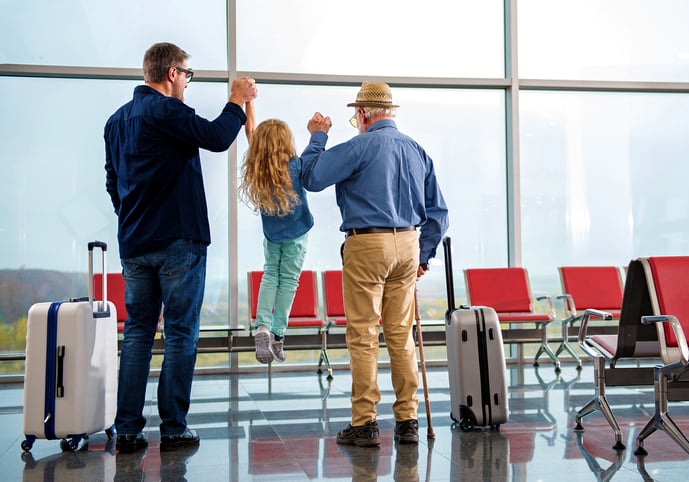
Millions of people hit the roads, rails or airways every holiday season. If you’re traveling with an older adult with dementia or another form of memory loss, however, you may have extra concerns this year. The good news? Although some extra planning and preparation may be necessary, holiday travel is still possible for many people in memory care. Read on for a roundup of tips aimed at helping you enjoy happy holidays while traveling with your aging loved one.
1. Choose your destination wisely
People with Alzheimer’s disease and other forms of memory loss may have increased agitation in unfamiliar environments. Traveling to known places, such as a family member’s home or a former vacation destination, may minimize agitation. Bringing along familiar items, meanwhile, can further support your loved one's comfort and wellbeing.
2. Plan travel times and methods carefully
Most people with memory loss have good and bad times of the day. Scheduling travel around these constraints will make the trip easier on everyone. For example, if sundowning is an issue for your aging loved one, morning or early afternoon departure may be preferable to an evening flight.
Additionally, avoiding peak travel times, such as morning and afternoon rush hours, minimizes exposure to crowds, long lines, and tight connection times. Morning flights offer yet another advantage: If you miss your flight, or if it’s delayed or canceled, you’ll have more options for substitute flights.
While direct flights are always preferable, sometimes connections are necessary. If so, connecting through less busy airports that are unlikely to be impacted by snow and ice events can help you avoid additional holdups. Just be sure to allow ample time between flights. While spending two or three hours on a layover with your aging loved one may not be ideal, sprinting through an airport—or missing your flight entirely—is an even less desirable scenario. Depending on your aging loved one’s comfort zone, having lunch together or simply watching planes take off can help you kill time during a layover.
Notifying the airport staff in advance that you’re traveling with a person with memory loss can help them help you, such as by accelerating your path through security, providing a wheelchair, of boarding first. Once onboard, noise-canceling headphones, favorite snacks and comfort items such as a cherished blanket can be useful distractions.
Driving may seem preferable to flying, but there are extra considerations here, too. Sitting in a car for long periods of time can be uncomfortable and even dangerous for seniors with memory loss—especially those with physical ailments, such as chronic back pain or a history of a blood clotting disorder. So while the urge to get to your destination as soon as possible can be strong, limit time in the car to six to eight hours a day. Scheduling overnight stops along the way isn’t just better for your aging loved one; it’s also better for you as the driver. Another benefit of driving? If your loved one does get restless or hungry, you can always pull over and take a break.
3. Have a Plan B
In a perfect world, everything on your trip will go smoothly. In the real world, many obstacles can arise—including weather emergencies. In the week leading up to your trip, keep an eye on the forecast. If bad weather is headed your way, consider moving your trip up to get ahead of it, if possible. If you can’t leave early, check the forecast along the way so you can stop and spend the night somewhere if winter weather gets in your way.
Even if you’re traveling where it’s sunny and 75, the unexpected can happen. Be prepared for breakdowns and other holdups by keeping your car stocked with necessities, such as food, water, a flashlight, blankets, and medication. Also, make sure your phone battery stays charged throughout your trip. That way, you’ll be able to call for help, if the need arises. Packing “worst-case” bags for you and your loved one and keeping them accessible throughout your trip can further ensure that you’ll have everything you need at your fingertips—wherever and whenever.
It’s also important to remember that when it comes to traveling with someone with memory care, Plan B may not be enough. Keeping an open mind and committing to being flexible can help you pivot without completely derailing your trip.
Other invaluable tools for traveling with someone with memory loss? ID bracelets and traveling cards. The former will make it easier to reunite with your aging loved one if you get separated while the latter provides critical information to relevant parties, such as flight attendants and restaurant services. You can learn how to make traveling cards here.
One last thing to keep in mind? All of these tips share one overarching theme: they lead with your loved one’s comfort and wellness in mind. In some cases, this may mean not traveling at all. If a senior with memory loss is resistant to traveling, pressuring them may only make the situation worse. In this case, a quiet holiday at home can also be a beautiful and memorable way to connect while celebrating the season.












